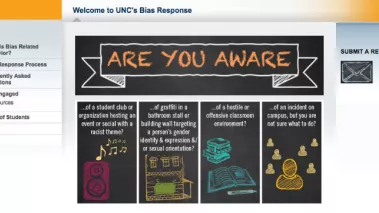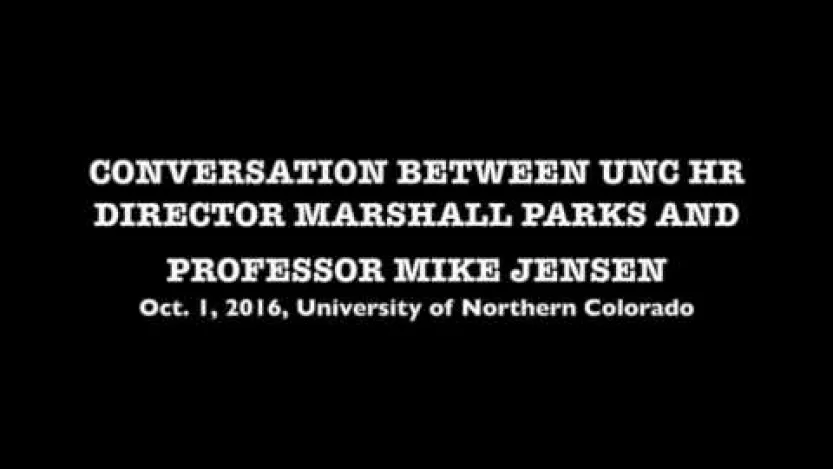Table of Contents
University of Northern Colorado Defends, Modifies ‘Bias Response Team’ as Criticism Mounts and Recording Emerges

Last month, documents provided in response to a public records request by Heat Street suggested that the University of Northern Colorado (UNC)’s “Bias Response Team” improperly intervened to instruct professors to avoid controversial subjects. Those records have spurred letters of inquiry from two state senators; a condemnation from the Denver Post editorial board; and concessions from a UNC administrator that the Bias Response Team’s efforts may have, in some cases, been improper. Now, just as UNC’s president defends the Bias Response Team’s purpose, one of the professors reported to the Bias Response Team has come forward with a recording of his meeting with a UNC administrator.
Mike Jensen, an adjunct professor teaching freshman writing courses at UNC in 2015, invited students to read The Atlantic’s “The Coddling of the American Mind,” co-authored by FIRE President and CEO Greg Lukianoff. The piece argues that education in critical thought requires exposure to diverse (and sometimes controversial) views, as a means of addressing challenging subjects—a point Jensen sought to use as a starting-off point for discussion.
When a student brought up transgender rights, the professor engaged the class by voicing common arguments against the student’s perspective. Another student, who identifies as transgender, filed a bias incident report (embedded below), and Jensen was summoned to the office of Marshall Parks, UNC’s executive director of human resources. Jensen brought his cell phone and recorded the conversation—an act permitted by Colorado law.
In audio first published by Heat Street and the Greeley Tribune, the recording—transcribed by Heat Street here—gives an unvarnished look into what happens behind closed doors when a professor is reported to a bias response team:

The recording confirms FIRE’s concerns about the chilling effect that bias response teams can have when they confront professors about classroom discussions. Administrators tend to be risk-averse and, like many others, prefer to resolve conflict rather than encourage it. That can conflict with professors’ goals of stimulating discussion by presenting material or arguments that challenge students to respond to, to consider, and to criticize positions taken by their peers, professors, and society at large.
While Parks, tasked with enforcing the university’s Title IX obligations, agrees with the professor’s concerns and—to Parks’ credit—attempts to accommodate those concerns, he makes it plainly clear that the goal is to avoid sensitive topics that might necessitate wasteful investigations:
I think the student does identify as transgender, and so she’s hearing what I heard you say, an argument that people could make is, [but] she is hearing that as your personal opinion, and that’s where the difference is. [...]
And providing obviously that we want to have the discourse, we want to have this sort of discussion– I mean that’s value for all of us being here, that part.
I think that the piece that we have to be sensitive of in this case too is that certainly Title VII and Title IX, gender discrimination issues– if someone were to say, ‘This is my opinion,” that someone perceiving that comment as discriminatory is possible.
I mean you presenting that as something someone might think, not as something you think, is a big distinction here, so I think the way you present it, the way you describe it to me makes perfect sense. Again, you’re approaching the topic in a sensitive and appropriate manner.
[...]
I mean I think, they can take this to the EEOC and you guys spend a lot of time writing documents, getting other students to say, “I heard them say it this way.” Last place we want to go. I mean it’s just—it’s not productive. (Inaudible) and your intent is not to discriminate against this student or make them feel uncomfortable, I mean, not to make them feel uncomfortable about this but to make them feel uncomfortable about how they think, and that’s a positive piece.
Spending a lot of energy explaining that subtlety to a whole lot of administrative logjam is not the best use of our time
So if you can avoid the topic for the rest of the semester, that’s our ideal place, so then we don’t have to [inaudible] the exciting, positive part of what you are doing.
If you think it’s a topic we need to retouch on again, let me know so I can work with you and in student’s office, work with the student, keep the student where they are, which is in a pretty good place. And I just want to keep them that way. [...]
We’ve had students with these really strong kinds of religious beliefs, we just had to get them out, they just aren’t in a place where they can take a class and have discussions like that. And so we just have to get them in a different spot.
This student, by and large, was receptive to the concept and the class. It was just that that one piece was too personal. So you didn’t know it, you didn’t step on her on purpose, and I think, if we can avoid it through the semester, great, if you don’t think we can, I think that’s OK, too.
The good intentions of the Bias Response Team are also reflected in a letter sent Tuesday to the UNC community by the university’s president, Kay Norton. The letter acknowledges that some of the reports “suggest an inappropriate effort to influence what happens in our classrooms”—presumably referring to the university’s response to the report concerning Mike Jensen. The letter, published by the Greeley Tribune, also defends the Bias Response Team’s intentions:
It goes without saying that we cannot tolerate any limitation on free speech, academic freedom or diversity of opinion at UNC. Nor can we tolerate discrimination, harassment or bias. These are absolutes. [...]
Upholding free expression and academic freedom is not antithetical to being a welcoming and inclusive campus. Talking openly about the inherent tensions between these things is hard and messy work, but conversations like this speak to the very essence of being a university.
It is unfortunate when those at the extremes of the political spectrum attempt to portray civil interaction and community building as the enemies of free speech. But we know better. Of course we do not condone limits on free speech, but that does not prevent us from engaging in thoughtful and provocative discussion about how we can build community within the context of free expression.
But academic freedom chilled politely is still academic freedom chilled. And, here, it was. While exploring possible accommodations for the professor to respond to controversial subjects, UNC’s human resources director clearly indicated that doing so might still mean spending needless time explaining to other investigators the difference between taking a position and pretending to take a position for the sake of discussion—a distinction without a difference. This was the good speech cop warning about how difficult the bad speech cops might be.
Likewise, Parks’ report in response to the BRT indicates his intent:
I advised him not to revisit transgender issues in his classroom if possible to avoid the students expressed concerns. [...] I told him to avoid stating opinions (his or others) on the topic as he had previously when he was working from the Atlantic article. He felt this was workable as the topic had not come back up in any of the sections and they had moved past the general discussion on how to identify interesting topics to write on as the semester has progressed.
Jensen tells the Greeley Tribune that he “constantly” self-censored as a result of the meeting, and he tells Heat Street:
We had a cordial visit, but [the administrator] definitely used the "velvet glove" approach, where he managed to threaten without using a threatening tone, [...] But threatening tone or not, I can certainly tell you that I felt that I had no academic freedom.
And while it would be speculative to link it to the bias incident report, Jensen was not invited back to UNC.
UNC has pledged to evaluate the university’s Bias Response Team. What changes would be made are unclear, although the Bias Response Team will reportedly undergo new training before the fall semester.
In the meantime, UNC already appears to be making changes. On Friday, UNC deleted a list of frequently asked questions and modified a website describing the Bias Response Team’s goals to add new language (in bold):
Engage individuals and groups impacted by bias related behavior in educational dialogue and conflict coaching around bias-related behavior, and concepts of privilege and oppression as it relates to the social construction of identity and marginalization and/or minoritization of specific individuals and/or groups.
It may not seem like much at first blush, but pledging to help students themselves respond to offensive speakers is an encouraging first step. There’s a critical difference between an administrator—backed by vague policies granting the administrator the power to impose discipline on a student—responding to offensive speech, and an offended student responding to the offending student with more speech. Encouraging students to engage with offensive speech by using more speech is the very remedy envisioned by the First Amendment.
Of course, that’s not all that UNC can or should do.
Training administrators on the complex and nuanced application of First Amendment principles would be another welcome step. UNC can also demonstrate its commitment to the First Amendment by eliminating vague policies governing student and faculty speech and adopting a robust policy affirming its commitment to freedom of speech and academic inquiry. If it did so—and FIRE is happy to help—UNC could shed its tarnished image and become Colorado’s second "green light" institution.
The bias incident report, provided to Heat Street in response to a public records request, is here:
Recent Articles
Get the latest free speech news and analysis from FIRE.

VICTORY: Court vindicates professor investigated for parodying university’s ‘land acknowledgment’ on syllabus

Can the government ban controversial public holiday displays?

DOJ plan to target ‘domestic terrorists’ risks chilling speech
